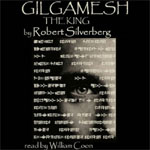
 Gilgamesh the King
Gilgamesh the King
By Robert Silverberg; Read by William Coon
MP3 Download – Approx. 13 Hours 22 Mins – [UNABRIDGED]
Publisher: Eloquent Voice, LLC
Published: September 2010
ISBN: 9780984413898
Themes: / Fantasy / Gods / Demi-gods / Ancient Civilization /
The Epic of Gilgamesh is one of the earliest known works of literature, being from around 2200 B.C. It tells of Gilgamesh the king of Uruk (a city-state in Sumer) who is half human and half god.
If you are as unfamiliar with the story as I was, here it is in a nutshell. Gilgamesh is running rather roughshod over the people of Uruk. When they beg the gods to make him a good king, the gods create Gilgamesh’s equal, a wild man named Enkidu. After discovering that they are indeed equals, the two become fast friends and have many adventures together, one in particular because Gilgamesh rejects the goddess Ishtar’s marriage proposal. When the gods become offended by one of the adventures and take Enkidu’s life as forfeit, Gilgamesh becomes obsessed with the idea of immortality. He then sets off on a new series of adventures in quest of eluding death, only to find that all men must die. He returns to Uruk and becomes the good king that the people wanted all along.
After a story has been around as long as the Epic of Gilgamesh, it is not surprising that there are several versions which have been recovered on ancient clay tablets. What is surprising is that Gilgamesh’s story is alive and well in different versions in modern culture, ranging from music to television to video games. That makes it more understandable that Robert Silverberg, that prolific master of science fiction, brought his talents to bear on retelling the tale in 1984. One wonders how earlier authors missed taking advantage of a story with such fantastic elements: a demi-god, slayer of monsters and master warrior, searching for the key to immortality.
Silverberg spins a mesmerizing tale that follows the basic plotline of the original epic. Told by Gilgamesh himself, it begins with the funeral of his father and 6-year-old Gilgamesh’s realization that friends and servants are being sent to their death so they can serve the king in the next life. Thus, the theme of man’s struggle with the inevitability of death is introduced. We also meet the young girl who will become the high priestess of Inanna (Sumerian goddess equivalent to Ishtar). As the personification of the goddess of love and war, she both tempts and infuriates Gilgamesh in a lifelong struggle for love and power. As well as the exciting adventures and fun of seeing how Silverberg interpreted the original epic, we see also that Gilgamesh is pondering the big questions of life: why must people die, what is the meaning of life, and how to balance destiny with action and free will.
In the afterword, Silverberg himself admits that he strove to give the story a historical setting and tell it from the point of view of the original Gilgamesh, the king, although he wove in elements of the epic. I have seen reviewers who lament this approach. It is true that in some of Gilgamesh’s adventure Silverberg has stripped them of their fantastic elements and the result was to make those parts mundane compared to the epic. However, I do not think that this book’s critics give Silverberg enough credit. As Mary Stewart did with her Arthurian novels (The Crystal Cave, etc.) and C. S. Lewis did in his retelling of the myth of Cupid and Psyche (Till We Have Faces), Silverberg carries the reader to ancient times and into the mind of the main character. Gilgamesh experiences the gods’ power and magic and, thus, so does the reader. The writing style is appropriately spare and simple, as if to echo how it would have been written in antiquity, as well as how difficult it would have been for an action-oriented hero to get his thoughts written down.
William Coon’s narration is what makes this book come alive. I honestly doubt if I would have stayed with the book past the first few chapters if he hadn’t communicated Gilgamesh so clearly. Coon’s ability to slightly change intonation so that listeners feel Gilgamesh’s emotions and motivations was what pulled me into caring about the character. That same ability to slightly change intonation and inflection allowed him to faithfully communicate other characters so that I could feel I knew Inanna and Enkidu especially. Somehow his reading also managed to echo that spare, simple style that one would imagine was faithful to early storytelling. Suffice it to say that William Coon’s narration transformed the book into a trip to the past for me. Perhaps it is that narration, in fact, which allowed me to overlook the elements which critics decried when Silverberg chose a scientific explanation over a mystical one.
This was a superior listening experience and I highly recommend the book based on that fact, as well as the book itself.
Posted by Julie D.

Excellent review Julie.
Gilgamesh The King is now available on audible.com too!
http://www.audible.com/pd/ref=sr_1_2?asin=B004SIIZAM&qid=1301623515&sr=1-2